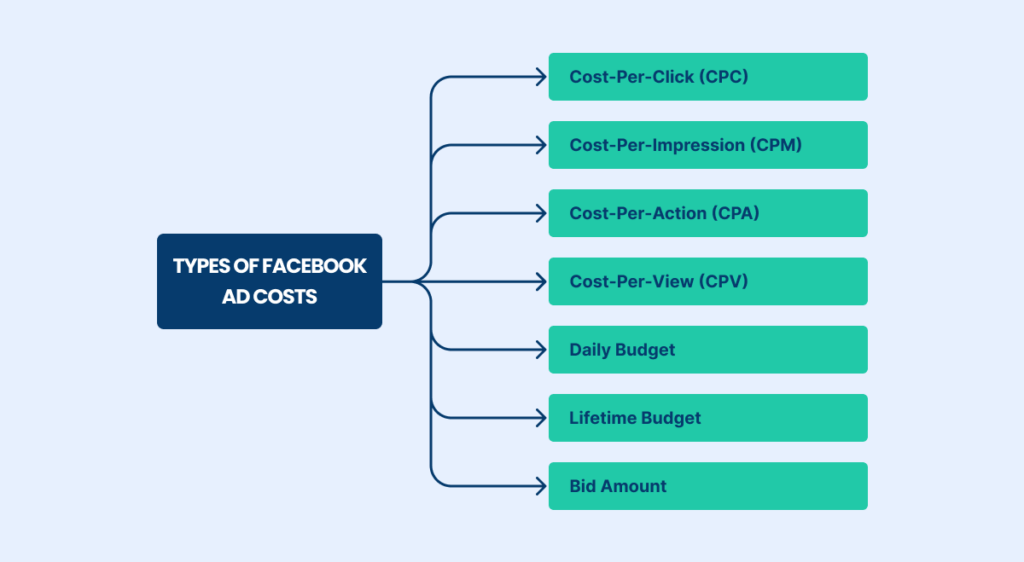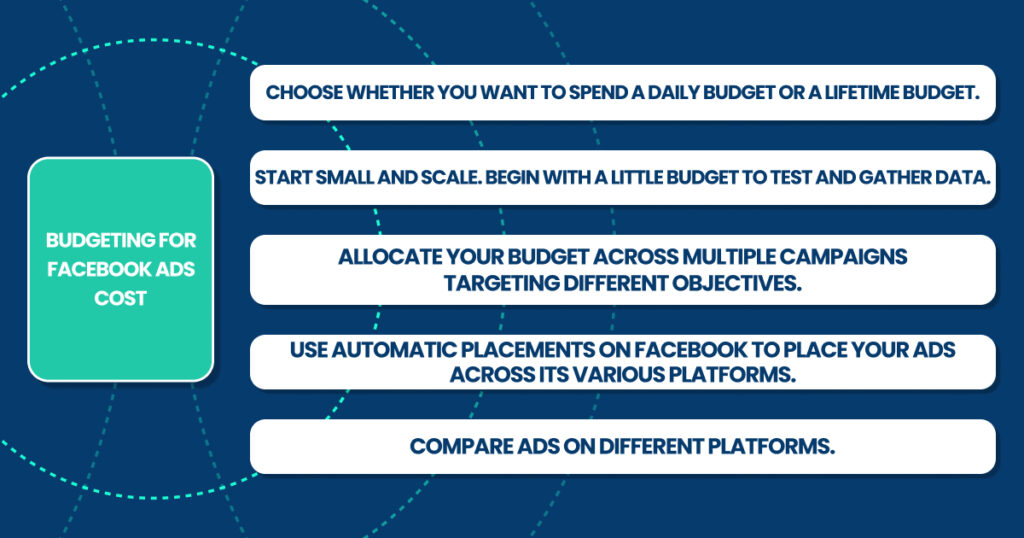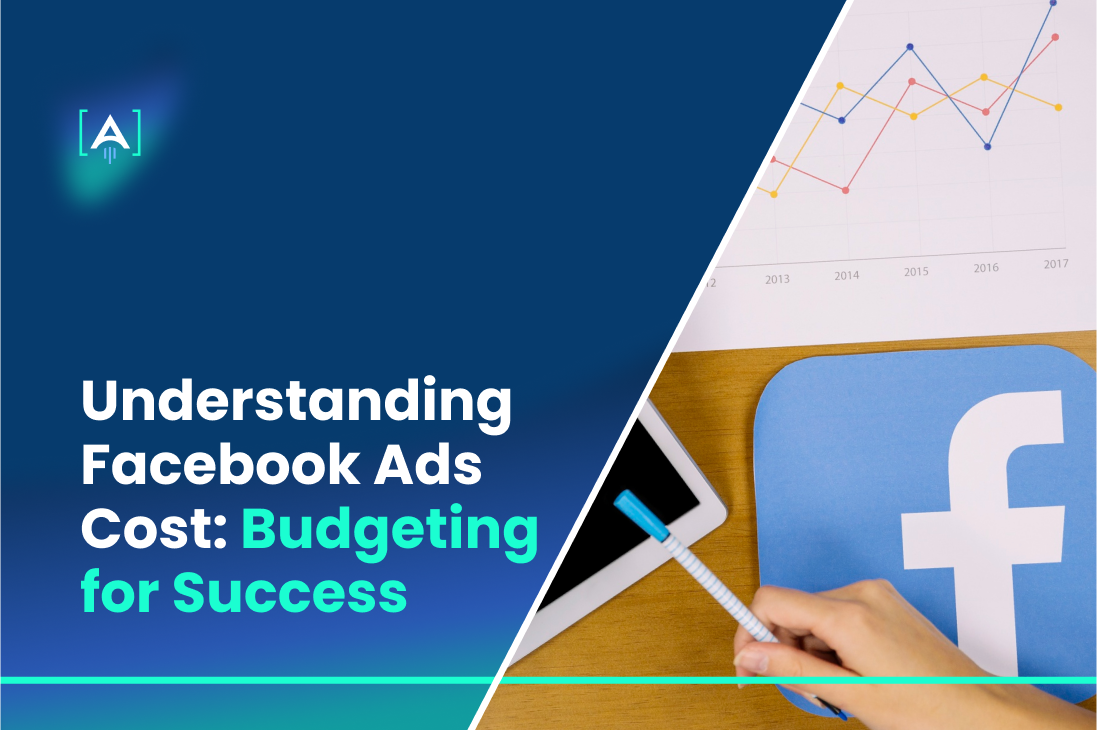Being aware of the intricacies of Facebook Ads cost is crucial for any business aiming to maximize its advertising budget.
Advertisers are said to spend over $94 billion on Facebook Ads in 2024, underscoring the platform’s importance and potential impact.
However, without a clear grasp of the factors influencing the cost of Facebook ads, businesses can easily overspend and underperform.
At Azarian Growth Agency, we specialize in helping businesses navigate the complexities of Facebook advertising.
As a leading Facebook Ads Agency, we understand the importance of cost-efficient ad campaigns that deliver results.
In this article, we’ll delve into what determines Facebook Ads cost, the various ad costs, and how to budget effectively for success.
By comprehending these elements, businesses can better plan their marketing spend, optimize their ad performance, and achieve their desired outcomes.
What Determines Facebook Ads Cost?
The objectives of your Facebook ad campaign significantly influence the cost of Facebook ads. Different goals, such as brand awareness, engagement, or conversions, come with varying costs.
Typically, conversion-focused campaigns are more expensive due to their direct impact on sales and business growth.
Target Audience
The size and particularity of your target audience also affect the Facebook ads cost.
Highly targeted ads aimed at niche audiences often cost more per click or impression due to the increased competition for these specific groups.
Conversely, broader audiences may result in lower costs but less precise targeting.
Ad Placement
The placement of your ads—whether they appear in the News Feed, Stories, Marketplace, or Audience Network—can influence costs.
Ads placed in high-visibility areas like the News Feed generally incur higher costs than those in less prominent placements.
Ad Quality and Relevance
Facebook uses an auction system to choose which ads to show to users.
Ads with higher relevance scores—indicating they are more pertinent and engaging to the targeted audience—tend to have lower costs.
Ensuring your ads are high quality and relevant can help reduce your overall ad spend.
According to WordStream, the average Facebook ad costs around $0.97 per click, which highlights the importance of ad quality in managing costs effectively.
Source: Statista(Average cost per click (CPC) rates for Facebook advertising in selected countries worldwide in January and February 2024)
Bidding Strategy
Your chosen bidding strategy, whether it’s the lowest cost, bid cap, or target cost, plays a crucial role in determining your ad costs.
Each strategy offers different advantages and can impact how Facebook allocates your budget and the efficiency of your spending.
By understanding and optimizing these factors, businesses can better manage their Facebook ad budget and achieve more cost-effective and impactful ad campaigns.
Types of Facebook Ad Costs
Understanding the different costs associated with Facebook ads is essential for effective Facebook ads budgeting. Here are the primary types of expenses you should be aware of:
Cost-Per-Click (CPC)
- This is the amount you pay each time someone clicks on your Facebook ad. It’s a common pricing model for ads that drive traffic to the website or landing page.
Cost-Per-Impression (CPM)
- This refers to the cost per 1,000 impressions. It’s useful for Facebook ad campaigns that aim to enhance brand awareness by reaching a large audience.
Cost-Per-Action (CPA)
- This is the amount you pay when a user takes a specific action, such as purchasing or signing up for a newsletter. It’s ideal for conversion-focused campaigns.
Cost-Per-View (CPV)
- This is the cost for each view of your video ad. It is used in video-centric campaigns to increase engagement through video content.
Daily Budget
- This is the average amount you are going to spend on your ad campaign daily. It helps you be in control of the daily ad spend and see with your Facebook ad budget that you are not going to overspend.
Lifetime Budget
- This is the total amount you’re ready to spend over the whole duration of your ad campaign. It provides flexibility in how the budget is spent over time, optimizing the spending across the campaign’s run.
Bid Amount
- In the Facebook ad auction, you set a bid amount indicating the maximum you’re willing to pay for your desired outcome, such as a click, impression, or action.

By understanding these cost types, you can better plan your ad campaign and allocate your ad budget effectively, ensuring that your Facebook advertising efforts are both efficient and successful.
Whether you’re working with Facebook ads agencies or managing your own campaigns, knowing how to run Facebook ads efficiently can help you achieve your marketing goals.
Understanding the Facebook Ad Auction
The Facebook ad auction is critical to how Facebook determines which ads to show users and at what cost.
Understanding this process can help advertisers optimize their Facebook ads and manage their ad budget more effectively.
How the Facebook Ad Auction Works
Every time there is an opportunity to show an ad to a user, an auction is held. Advertisers bid for the placing of their ads, but the highest bid only sometimes wins. The auction takes into account three key factors:
Bid Amount
- This is the amount an advertiser is willing to pay to achieve their desired outcome, such as a click or conversion. The bid can be set manually or automatically through Facebook’s bidding strategies.
Ad Quality and Relevance
- Facebook evaluates the quality and relevance of the ad. Ads that are engaging and relevant to the target audience are more likely to be shown, even if their bid is lower. This ensures users see high-quality, pertinent ads, improving their overall experience.
Estimated Action Rates
- Facebook predicts how likely users are to complete the desired action (e.g., click, conversion) after seeing the ad. This prediction is based on the ad’s historical performance and user behavior.
Optimizing for the Facebook Ad Auction
Advertisers must improve their ad quality and relevance to succeed in the Facebook ad auction.
Here are some strategies:
Create High-Quality Ads
- Make sure your ads are visually appealing and contain a compelling copy. High-quality ads attract more attention and perform better in the auction, potentially lowering your Facebook ads cost.
Enhance Relevance Scores
- Customize your ads to match the interests and behaviors of your target audience. Use tools like Facebook Ads Manager to gain insights and refine your targeting. Higher relevance scores can reduce the cost of Facebook ads by making your ads more competitive in the auction.
Leverage Data and Analytics
- Analyze your ads’ performance regularly to identify trends and areas for improvement. Adjust your strategies based on this data to enhance the effectiveness of your Facebook advertising.
Optimize Bidding Strategies
- Decide on the right bidding strategy based on your campaign goals. Whether you opt for the lowest cost, bid cap, or target cost, ensure your bid aligns with your objectives and budget constraints.
Source: TheSocialSavannah
Benefits of Understanding the Facebook Ad Auction
By understanding how the Facebook ad auction works, advertisers can make well-thought-out decisions that enhance their social media advertising efforts.
Optimizing for the auction can lead to the following:
Lower Ad Costs
- By improving ad quality and relevance, you can achieve better placements at lower costs, maximizing your ad budget.
Better Ad Performance
- High-quality, relevant ads are more likely to engage users, causing higher conversion rates and more effective campaign performance.
Efficient Budget Allocation
- Understanding the auction dynamics helps allocate your budget more efficiently, ensuring your Facebook ads deliver the best possible return on investment.
In conclusion, mastering the intricacies of the Facebook ad auction is essential for any advertiser looking to succeed on the platform. By focusing on ad quality, relevance, and strategic bidding, businesses can optimize their Facebook advertising costs and achieve superior campaign results.
Budgeting for Facebook Ads cost
Effective Facebook ads budgeting is crucial for maximizing the impact of your advertising efforts while managing costs.
Here are key strategies to help you budget for Facebook ads successfully:
Daily vs. Lifetime Budgets
When setting your Facebook ad budget, you can choose whether you want to spend a daily budget or a lifetime budget.
A daily budget controls the average amount you spend each day on your ad campaign. This approach is helpful in maintaining consistent ad spend and ensuring you don’t exceed your daily limit.
On the other hand, a lifetime budget sets the total amount you’re willing to spend over the entire duration of your campaign.
This offers more flexibility, allowing Facebook to optimize spending throughout the campaign’s run, which can lead to better overall performance and cost efficiency.
Setting a Realistic Budget
Setting a realistic budget is important for achieving success with Facebook advertising.
One effective strategy is to start small and scale. Begin with a little budget to test the waters and gather data.
As you identify what works and what doesn’t, you can gradually increase your ad spend to scale successful campaigns.
Additionally, consider industry benchmarks for Facebook ads costs. Researching industry standards can give you an idea of what to expect and help you set a realistic budget that aligns with your marketing goals and financial capacity.
Allocating Budget Across Campaigns
To escalate the success of your Facebook ads, it’s important to diversify your ad spending and allocate your budget across multiple campaigns targeting different objectives, such as brand awareness, engagement, and conversions.
This balanced approach ensures that you’re not risking and putting all your eggs in one basket and can achieve various marketing goals simultaneously.
Moreover, continuously monitoring your campaigns using tools like Facebook Ads Manager allows you to identify high-performing campaigns.
By reallocating the budget from underperforming ads to those delivering the best results, you can optimize your overall ad campaign performance.
Tips for Efficient Budgeting
Implementing smart budgeting tips can further enhance your Facebook ads management.
Using automatic placements allows Facebook to place your ads across its various platforms, including Facebook, Instagram, and Audience Network, to get the best results for your budget.
Setting spending limits at the campaign or account level can prevent overspending and keep your Facebook ad budget in check.
Additionally, regularly reviewing and adjusting your bidding strategy and ad creatives can improve performance and reduce costs.
Utilizing the Facebook ad auction to your advantage by bidding smartly ensures you’re getting the most out of your ad spend.
Comparing Ad Platforms
Understanding the differences between Google Ads vs. Facebook Ads and LinkedIn Ads vs. Facebook Ads can help you make thorough decisions about where to allocate your budget.
Google Ads offers intent-based targeting through search queries, which can be more expensive but highly effective for conversion-focused campaigns.
In contrast, Facebook Ads provide robust demographic and interest-based targeting, often at a lower cost, making them ideal for brand awareness and engagement campaigns.

Similarly, LinkedIn ads might be more suitable for B2B marketing due to their professional user base, whereas Facebook offers broader reach and versatility for various advertising objectives.
By following these strategies, you can create a robust Facebook ads management plan that effectively utilizes your budget, maximizes your return on investment, and achieves your marketing objectives.
Tips for Better Budgeting on Facebook Ads
Ready to make every dollar count in your Facebook ad campaigns?
Here are some quick and easy tips to help you budget like a pro!
Set Clear Goals
- Define specific objectives (e.g., brand awareness, lead generation) to allocate your ad budget effectively.
Start Small, Scale Up
- Test with a modest budget and increase ad spending gradually based on performance.
Use Campaign Budget Optimization (CBO)
- Let Facebook automatically distribute your budget across top-performing ad sets.
Leverage Audience Insights
- Use Facebook Ads Manager to refine targeting and reduce wasted ad spend.
A/B Test Creatives
- Test images, videos, and copy to find the most effective combinations.
Set Spending Limits
- Implement daily or lifetime spending limits to stay within your budget.
Retarget Interested Users
- Use retargeting to engage users who have previously interacted with your brand.
Optimize Ad Placement
- Allow automatic ad placements for better performance and cost-efficiency.
Monitor and Adjust Regularly
- Frequently review campaign data and adjust strategies based on performance.
Stay Informed
- Keep up with Facebook’s latest updates and tools to enhance your ad strategies.
These tips can help you manage your Facebook ad budget more effectively, ensuring you get the best results from your Facebook advertising efforts.
Partner with [A] Growth Agency to Optimize Your Facebook Ads Budget
Mastering the art of budgeting for Facebook ads can significantly enhance your campaign’s effectiveness and return on investment.
Consider partnering with a professional team to take your Facebook advertising to the next level.
As a leading Facebook Ads Agency, we optimize ad campaigns to deliver maximum results.
Let us help you navigate the complexities of Facebook ads and achieve your marketing goals with precision and expertise.
Partner with [A] Growth Agency today and see the difference we can make for your business!

